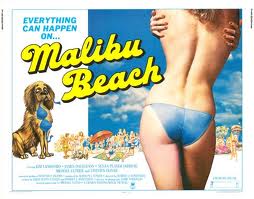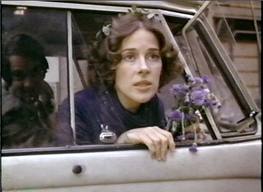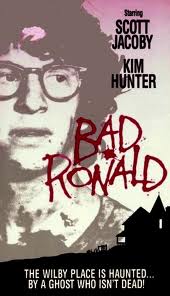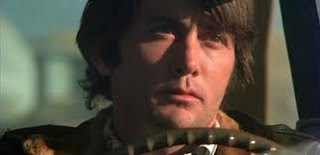Since it's the dead of winter, I decided to give the finger to the cold and rainy California weather by watching a bunch of beach movies from the golden era of the late 70's/early 80's. While viewing, I observed certain similarities in the ingredients of the genre. Specifically, I noted the recipe for a beach movie of this era required the following:
- 2 generic fun-in-the-sun songs that can be replayed endlessly on the soundtrack
- 1 middle-aged beachcomber with a metal detector to trip over
- 1 bikini-top stealing dog (or dude)
- 1 virginal, smoking hot heroine
- Copious amounts of marijuana
- 2 or more incompetent law enforcement officials
- A sprinkling of peepers
- And add T & A to suit taste
Despite their formulaic nature, I did find each movie was different enough to distinguish it in some way. Even with their predictable dumbness, they're still enjoyable trash, with one actually elevating itself out of the dust bin. In the end, all three brought me out of my winter doldrums and kept me entertained. Thanks low-brow beach movies, mission accomplished.
California Dreaming (1979)
Synopsis: A Chicago boy travels to a small beach community in sunny California and hangs out with its denizens.
This is the class of the beach movies I viewed, most likely due to the large amount of talent involved. For example, the director, John D. Hancock, did some really underrated films in the 70's including Let's Scare Jessica to Death, Bang the Drum Slowly, and Baby Blue Marine. He does a decent, workmanlike job with a few nice touches here and there to make this another underrated, solid effort. The actors were far more impressive than would normally inhabit this genre with the lead role played by Dennis Christopher and a supporting cast of Seymour Cassel(!), Dorothy Tristan, John Calvin, Tanya Roberts, Stacy Nelkin, James Van Patten and with comedy veterans Todd Susman and Alice Playten. Glynnis O'Connor, who played John Travolta's love interest in The Boy in the Plastic Bubble, and Billie Joe McCallister's (Robbie Benson) friend in Ode to Billie Joe, seemed an odd choice to play the lead beach bunny, but she does look good in and out of a bikini and is a decent actress.
The story involves an ensemble of characters and has a surprisingly lucid interwoven plot structure that even gets downright dramatic in a few places. Credit writer Ned Wynn, who also costars, for a script that was much deeper than it had to be. Make no mistake, the film is still a light comedy, but there are some genuine moments of pathos that occur along the way, especially at the end. Actually having a story, and somewhat believable characters, really elevated this film to something above the norm in the genre. There's a lot less exploitive elements, like gratuitous T & A (don't worry, there is still some) that occur, but that's a small price to pay for a better story and characters.
However, the film does have its share of problems. I thought the main one was with Dennis Christopher's character T.T. He begins as a kookie nerd and slowly transforms into…a better dressed, kookie nerd. The look of his character slowly, and believably, evolves from Chicago hipster to California beach boy, but he never stops acting like a goofball as his character arc seems to flatline. He is constantly pulling some kind of bonehead move like tripping, falling, spilling a drink or saying something stupid in every scene. This kind of clumsy dufus humor gets old real quick especially when the rest of the film doesn't resort to cheap slapstick stuff and treats its characters with a little more respect. Had Christopher's character been just a little more mature and believable, the film could have gone from pretty good to very good. Another big flaw is the title song and other original music which is horribly bland, mindless pop and reflects the lazy, uninspired opening credit sequence itself. However, the lame original music does have the unintended benefit of making Burton Cumming's and America's music in the middle of the film sound positively cutting edge.
I caught this again on Netflix Instant and the print, though flawed, is still the best and most complete incarnation I've seen since I saw its theatrical release. In terms of a quality beach movie, this one rates surprisingly high.
Score 7/10
Malibu Beach (1978)
Synopsis: Two guys and two girls fresh out of school hang out at Malibu beach.
Robert J. Rosenthal, who's only other picture was Zapped!, directed this low budget film that stars James Daughton, Kim Lankford, Steve Oliver and a slew of unknowns. Daughton, who is best known as fratboy president Greg Marmalard in Animal House, stars as the nice, white-bread boy Bobby who hangs out with his wiseacre friend Paul. They meet up with Kim Lankford and Susan Player's characters of Dina and Sally, and the wooing commences.
The film is episodic and pretty much lacks any kind of story, so it's up to the characters and the almighty T & A to carry it. Kim Lankford conveys a shy, sweetness and was the most likable of the characters, and as an added bonus, looked quite nice in a bikini. Steve Oliver's super dumbass, muscular bully character of Dugan was enjoyable in an almost WWF kind of way. He single-handedly kept the movie from becoming totally bland and forgettable with his awesome douchebaggery, and delivered great lines like "Nobody, I mean nobody, calls Dugie a turd!" Hey, it's not exactly "Nobody puts Baby in a corner", but it's funny. The T & A level is set at medium with gratuitous boobage about every 10 minutes or so just to keep interest up.
Unfortunately, the film is loaded with low budget technical problems including bad lighting, frequent dubbing and a crappy soundtrack that keeps getting recycled. The dialogue is cringe-inducing, and often sounds like two real-life teenagers conversing in a mono-syllabic/sentence fashion -
"Hey".
"Hey".
"S'up".
"Noth'n".
They might as well be grunting caveman-style at each other. There are a lot of episodic events that take place, but they all seem to happen in a vacuum and with no relation to each other. Even when characters hook up or fight, it seems almost spontaneously accidental. There is a mandatory Jaws joke near the end which is about as clever and funny as the movie gets.
Despite all the problems and the seemingly minimal effort that went into making the film, it's not horrible. But besides Lankford and Oliver's performances, and what seemed like obligatory T & A shots, there was just the bare minimum to enjoy.
Score 5.5/10
The Beach Girls (1982)
Synopsis: Two girls and a guy invade their friends uncle's beach house to hang out and party.
This is an all-out exploitation throwback by Bud Townsend, the director of the X-rated Alice in Wonderland and the semi-scandalous Coach. Give the man credit for knowing what is required for a dumb, fun beach movie and shoveling it out in bucketfuls. The movie is an almost non-stop T & A fest with dopey, offensive humor and the thinnest of plots. Nevertheless, there was a freewheeling sense of looniness to the film that the other two seemed to lack. Even though almost all of the humor is incredibly moronic, Townsend quickly and consistently doles it out, along with the naked women, to keep the entertainment coming at a breakneck pace. There's a genuine exploitation feel and even a little sleaziness that is oddly appealing. The biggest strength of the movie is the mega-cute, super sexy and very curvaceous Debra Blee. She's the anchor of the story playing a strait-laced girl who gets sucked into a massive party thrown by her boy-crazy girlfriends. Why Blee didn't get cast in more of this type of 80's fare is a complete mystery. She's got the looks and skills to easily carry any B-level film. James Daughton shows up again as a hunky, zen-like traveler who becomes the romantic interest for Blee's character. Her horned-up girlfriends, Ginger and Ducky (yes Ducky, I don't know why) are played by Val Kline and Jeana Tomasina, both of whom lack Blee's vavoom-ness, but are still naughtily attractive and nude it up quite nicely. Veteran bikesploitation actor Adam Roarke play's Uncle Carl, the owner of the invaded beach house and luckiest man on earth.
In the pantheon of brainless comedies, this one rates right near the top, but there's no denying its goofy energy. Blee is also quite appealing, and should have been cast in every beach, ski, roller disco and sky diving school movie made in the 80's.
Score 6/10
Of the three beach movies, California Dreaming is the only one I'd recommend watching sober. There's definitely some worthwhile acting performances, characters and storytelling. On the other end of the spectrum, you may want to smoke a Glad bag full of spleef before viewing The Beach Girls for maximum enjoyment. Regardless, if your snowed in, or rained in like me, beach films are the perfect cure for the wintertime blues.





















































